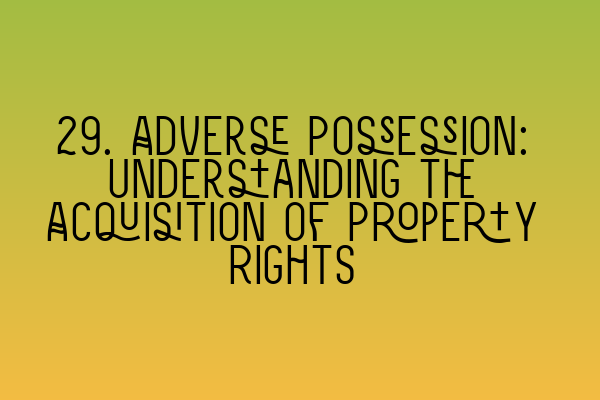Adverse Possession: Understanding the Acquisition of Property Rights
When it comes to property ownership, the concept of adverse possession can often lead to confusion and disputes. Adverse possession refers to the legal principle through which someone can acquire ownership of a property by possessing it in a manner that is open, notorious, exclusive, and hostile for a certain period of time. This principle aims to balance the interests of the true owner and the adverse possessor by awarding ownership to the person who has made use of the property for an extended period.
In this article, we will delve into the intricacies of adverse possession, exploring its requirements, benefits, and potential pitfalls. By understanding the legal framework surrounding adverse possession, you can protect your property rights and navigate any challenges that may arise.
Requirements for Adverse Possession
For adverse possession to occur, certain key requirements must be met:
- Actual Possession: The adverse possessor must physically possess the property and have control over it. This can include constructive possession, such as fencing the area or cultivating the land.
- Open and Notorious Possession: The adverse possessor’s actions must be visible and obvious to others. They cannot secretly occupy the property without the true owner’s knowledge.
- Exclusive Possession: The adverse possessor’s possession of the property must be exclusive, meaning they have sole control over it without sharing it with others.
- Hostile Possession: The adverse possessor must possess the property without permission from the true owner. This hostility can be inferred from the adverse possessor’s actions, demonstrating an intent to claim ownership.
- Continuous Possession: The adverse possessor’s possession must be continuous and uninterrupted for a specified period as determined by the law.
- Statutory Period: Each jurisdiction has its own statutory period during which adverse possession must occur. Typically, this period ranges from 5 to 20 years, depending on the jurisdiction.
Meeting these requirements can be complex, and it is crucial to seek legal advice to ensure you fully understand and comply with the law. Consulting with an experienced property solicitor is essential to protect your rights and avoid potential legal complications.
Benefits of Adverse Possession
Adverse possession has both advantages and disadvantages, depending on your perspective. Here are some benefits that an adverse possessor may gain:
- Property Ownership: The primary benefit of adverse possession is the potential to acquire ownership of a property. After the statutory period has been met and all requirements are fulfilled, the adverse possessor can apply for legal title to the property.
- Clear Title: Adverse possession can help resolve title disputes by establishing a clear and unambiguous ownership history. This can be particularly beneficial when dealing with properties where historical records are incomplete or unclear.
- Property Use: During the period of adverse possession, the adverse possessor can make full use of the property, including making improvements, renting it out, or utilizing it for personal purposes.
- Prescriptive Easements: In some cases, adverse possession can also lead to the acquisition of prescriptive easements, which grant rights to use a particular portion of a property, such as a driveway or a pathway.
It’s important to note that adverse possession should never be approached as a means to unlawfully and intentionally take someone else’s property. The principle is designed to address situations where land has been neglected and no action has been taken by the true owner to assert their rights.
Pitfalls and Limitations of Adverse Possession
While adverse possession offers some benefits, there are potential pitfalls and limitations to be aware of:
- Legal Challenges: The true owner of the property may contest the adverse possession claim, leading to legal battles and potential financial implications.
- Burden of Proof: The adverse possessor bears the burden of proving all elements of adverse possession. This can require extensive documentation, evidence, and expert testimony.
- Good Faith Requirement: Some jurisdictions require the adverse possessor to have acted in good faith, meaning they genuinely believed they had legal entitlement to the property.
- Exception for Registered Owners: In cases where the true owner is a registered landowner, adverse possession can be more challenging, as registered land is typically subject to stricter regulations.
- Disruption of Property Market: Adverse possession can disrupt property markets if prospective buyers are wary of purchasing a property with a potential adverse possession claim.
It’s important to approach adverse possession with caution and seek professional legal advice to understand the specific laws and regulations in your jurisdiction. An experienced property solicitor can guide you through the entire process, advising on the best course of action and helping you protect your rights.
At SQE Property Law & Land Law, we offer expert legal services to support and guide you in matters related to adverse possession and property law. Our team of experienced property solicitors can provide the necessary advice, handle all legal aspects, and ensure your rights are protected throughout the process.
To further enhance your understanding of property law and land law, we recommend exploring our related articles:
- SQE 1 Practice Exam Questions
- SQE 1 Practice Mocks FLK1 FLK2
- SQE 2 Preparation Courses
- SQE 1 Preparation Courses
- SRA SQE Exam Dates
By staying informed and seeking professional guidance, you can effectively navigate the complexities of property law and ensure the protection of your property rights.
